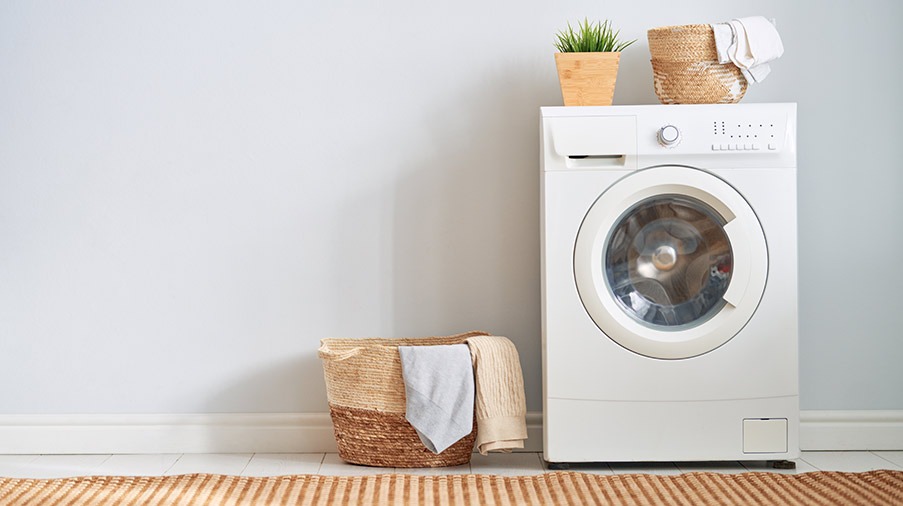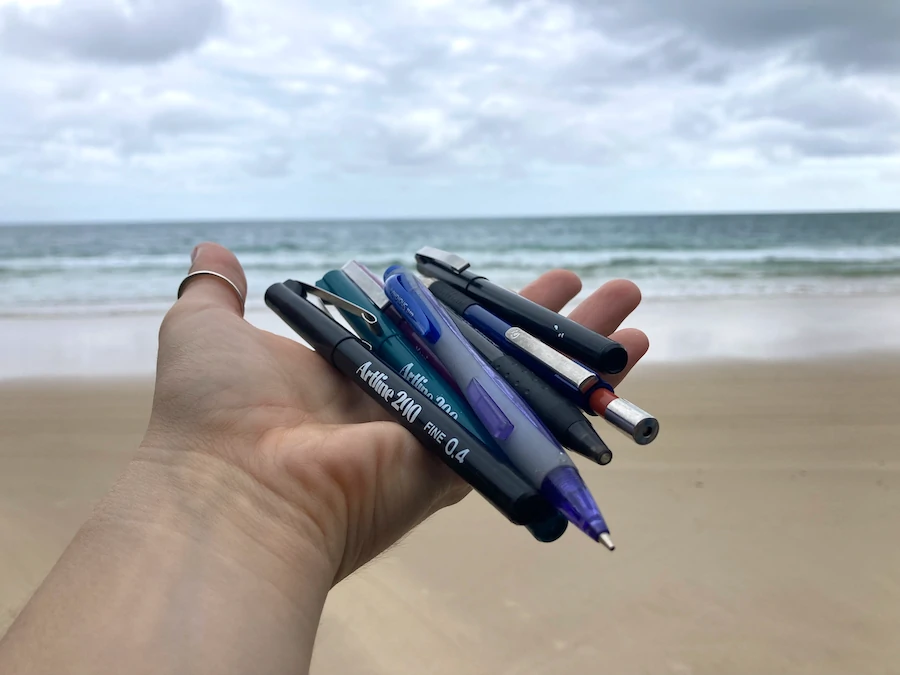
You may not know it, but your laundry routine is a great place to start when considering how to be more eco-friendly at home. Adopting eco-friendly laundry habits can significantly reduce your impact on the planet and save you money.
So, what are these tips for an eco-friendly laundry routine? First, wash your clothes a lot less. Use an eco-friendly pre-wash, wash your clothes in cold water, use less detergent, use eco-friendly detergent when you do, avoid using a dryer, and trap the microplastics that are unleashed in your washing machine, and say no to unnecessary dryer strips.
With our guide to eco-friendly laundry routines, you will be saving money and reducing your impact on the planet in no time. We hope this short guide will make you more eco-friendly and make your laundry routine that little bit easier.
7 Tips for an Eco-Friendly Laundry Routine
Adopting an eco-friendly routine is much simpler than you may think. It’s not just about the laundry products you use, it’s also about your laundry habits and methods.
1. Wash Your Clothes Less
Over the last decade or so, marketing campaigns from house product companies have turned us into a bunch of clean freaks. Now, we obsessively wash our clothes even when they don’t require washing.
Next time you throw something in the washing basket, ask yourself a few questions, “Do I really need to wash this?” “Is it really dirty?” “Does it actually smell?“. You may find that often that the answer is “No.”
Don’t just throw your clothes in the basket out of habit. Instead, assess whether it really needs washing. If not, fold it nicely back in your draw or put on a hanger in your cupboard.
The belief that we must wash our clothes after every single use has mostly been taught to us by laundry companies selling their products. It’s simply not true.
2. Use an Eco-Friendly Pre-Wash
That pre-wash from the supermarket is laden with unfriendly chemicals that are harsh to the planet. Try a more natural option like Multi-Purpose Pure Castille Soap Bars from Dr. Bronners (link to read reviews on Amazon).
These bars will help to remove stains from your clothes without leaching harmful chemicals into the water supply.
All you need to do is keep the bar near the washing machine. When you get a stain, grab the bar and rub on the stain to pretreat the clothes. Also, avoid using that pre-wash setting on your washing machine that is water and energy-intensive.
If you have a particularly bad stain, choose a stain remover before washing. You may find that dish soap works just as well for your stains.
3. Wash Clothes in Cold Water
Another belief that drummed into us by companies is that clothes must always be washed in warm water. Again, this is not true. In fact, most clothes can be washed in cold water even when the label says “use warm water.”
Some fabrics, like bamboo and hemp, actually prefer cold water. Using cold water often helps clothes to stay more durable and decreases the amount of wear and tear.
What’s more, using cold water uses a lot less energy, which further mitigates your impact on the planet. You’ll also save a load of money on your energy bills.
Before throwing everything into a warm wash, consider the pieces that don’t really need warm water and add them to a cold cycle. Warm water washes are best reserved for extremely dirty cotton, linen, or synthetic fabrics.
4. Use Less Detergent and Choose Eco-Friendly Brands
Woah! Steady on with all that detergent. You don’t need it so much. Another bad laundry habit we’ve picked up is using far too much laundry detergent. You actually only need a small amount to get the job done.
Laundry companies actually make the measuring cup big to influence you to use more. This helps you get back to the store for more sooner. Don’t fall for their tricks. Use a small amount for regular washing and a bit more for extra dirty items.
When you do go to buy your next detergent, consider opting for one that is eco-friendly. These products are specifically made to exclude harmful chemicals or toxins that pollute our waterways.
Top eco-friendly detergent brands in the US include:
- Tide Purclean (link to read reviews on Amazon)
- Seventh Generation (link to read reviews on Amazon)
- Method 8X (link to read reviews on Amazon)
- Tru Earth Laundry Strips (link to read reviews on Amazon)
- The Laundress (link to read reviews on Amazon)
Just because it’s eco doesn’t mean it lacks in quality. In fact, quite the opposite. These natural and eco-friendly detergents are even better than regular detergents!
5. Avoid the Dryer When Possible
Not feasible for everyone, depending on where you live in the world, but try to avoid using your dryer. Instead, put your clothes out on a line outside to dry in the sun and gentle breeze.
A dryer uses a significant amount of energy to dry your clothes. It also increases the amount of wear and tear of your clothes. In the long run, a dryer actually costs you a lot of money on both energy bills and buying new clothes.
If you use a dry cleaner, you may also want to rethink going back. Dry cleaners use vast amounts of energy and chemicals to get your clothes looking like brand new. If you need a dry cleaner for an upcoming wedding or function for your favorite dress or suit, try to find an eco-friendly dry cleaner.
These dry cleaners use less harmful chemicals and products. They also use less energy and water to give you the same result as your regular dry cleaner. Wet Cleaners USA (link to company site) is an excellent example of an eco-friendly dry cleaning service.
6. Prevent Microplastics from Escaping
Microplastics are a serious threat to our environment. What are they? They’re incredibly small pieces of plastic that come out of your fabrics during the wash. They’re so small they aren’t filtered out at water treatment plants.
Instead, they swim on through to the ocean. Microplastics have been dominating the headlines recently with research finding microplastics in “every animal” studied.
To help prevent adding to this situation, you can help trap microplastics using a Cora Ball (link to brand site). You can throw this innovative ball into your washer, and it works like a filter to remove microplastics. Soon, it’s believed new washing machines will have microplastic filters built-in.
7. Say “No” to Dryer Sheets
Dryer sheets are often referred to as the devil when it comes to eco-friendly cleaning. While they may not be as toxic as some make out, they aren’t particularly great either.
They’re simply additional waste that we really don’t need. Most people can get by just fine without a dryer sheet, and it’s probably best to leave them on the shelf from an eco-friendly perspective.
Dryer sheets are mainly used to help remove static from synthetic materials. As an eco-friendly consumer, you probably won’t have too many synthetic materials anyway. Even if you do, we think you could probably survive without dryer sheets.
Final Thoughts
So, there we have it. Eco-friendly washing doesn’t seem so daunting now. In fact, it’s quite simple with a few changes in laundry routine habits and a little bit more thought when buying laundry products at the supermarket.
You will most likely have discovered today that you wash your clothes far too much and that eco-friendly products can go a long way toward mitigating your impact on the planet. Anything we can do to reduce our impact is a step in the right direction.



